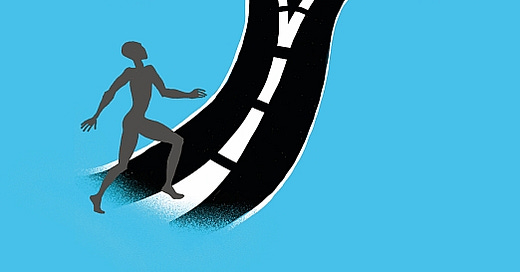The war on motorists
Guest post with the Future Cities podcast looks at the clampdown on UK roads, and what citizens are doing to reclaim them.
By Austin Williams of the Future Cities Project
The Department of Transport has announced guidance to local authorities to impose 20mph speed limits on all new urban streets and roads in England, with 20mph limits already proliferating in many council areas. From September 2023, 20mph will become the default speed limit across all urban roads in Wales. Hackney Council in London is set to ban most vehicles from 75 per cent of its roads. London’s Ultra Low Emission Zone (ULEZ) is set to expand to include all London boroughs, while train and bus fares will increase by the biggest jump in a decade. All of this begs the question: is the motorist in particular, and mobility in general, under attack?
It was over 20 years ago that a European sustainable-travel hierarchy was introduced with full backing of the UK government. Cycling and walking were placed at the top - obviously - with the car relegated to last place, after buses, trams and even horse-riding. While the car lobby managed to dismiss such assaults on the freedom to drive at the time, it is clear that the mood has changed. We are now in the invidious position of watching the RAC scuttle around advising the Welsh government on its speed-reduction strategy.
Nowadays, many accept the idea that the car, far from being the most comfortable, efficient, speedy and convenient mode of travel, is in fact a dangerous, polluting, anti-social, killing machine. Therefore, road and travel priorities have to change. The car has gone from being a tool to aid social connections to a weapon of mass destruction. The cynical contemporary assault on one of the greatest inventions in history has reached a tipping point.
Yet this view is at odds with the increasing safety of our roads. GB road deaths peaked in 1966 at 7,985, when all vehicles combined travelled a total of 107 billion miles – or one death for every 13.4million miles travelled. By 2019, deaths were down to 1,752, despite miles travelled going up to 308 billion miles – or one fatality for every 175.8million miles.
With health concerns foremost in people’s minds, it is now common to hear otherwise intelligent people reveal, as if an epiphany, that having fewer cars means fewer traffic accidents. In one fell swoop, pressure on the NHS is alleviated. Such childish calculations are now the centre-piece of the UK’s transport strategy. Or, more accurately, its anti-transport strategy. The mayor of London, Sadiq Khan, has made ‘cleaning up London’s air’ his battle-cry, using the death of Ella Adoo-Kissi-Debrah as a stick to beat critics of his crackdown on cars. This is all despite complaints from local residents that Low Traffic Neighbourhoods (LTNs) and other road closures have concentrated traffic and fumes on busy through-routes - often home to social housing, away from the leafy cobbled yards of LTN streets.
Of course, sustainability is the killer argument. Eighty per cent of all local councils in the UK have signed up to the climate emergency pledge – which forces them to restrict vehicle use in order, no less, to protect our children’s future. Stay home, Don’t Drive, Save the Planet. The lessons of lockdown are easy to see.
Indeed, this victory for cyclists, environmentalists and local authorities is premised on our confinement. The Scottish government has noticed that some people might have to travel – you know, to make unreasonable journeys to the hospital, or to visit relatives – and suggests that this can be minimised by ‘interventions that focus on alternative digital and hub-based models to allow people to access goods, services, amenities and social connections’. Whatever that means.
Practices that were nurtured during lockdown are now being put to good use in order to sell restrictive mobility to the public. After all, it was in 2020, while we were all confined to the sofa during the pandemic, that the government first handed over £380million to councils to maximise inconvenience for drivers in order to force them out of their vehicles and onto alternative modes of transport. Mercifully, not everyone has complied, and the inadequacy of the nation’s public-transport alternative has ensured that the car has played a vital service in keeping the country’s economy going.
But the attacks on car drivers continue apace: from low-emission zones now springing up all over the country, to 15-minute cities where you will be fined for crossing a notional border in your own town. Our ability to freely travel will now be controlled by high-tech surveillance and subsidised by egregious fines and penalties.
Seldom have our local representatives been more authoritarian; implementing road closures in the dead of night and without consultation – or famously ignoring the results of public consultations. The accompanying article by Ella Whelan on Sadiq Khan’s ULEZ proposals is a classic insight into the growing sense of untouchability by our elected officials. Instead of representing us, they are simply insisting that we do what we are told.
In this accompanying podcast, anti-LTN campaigners Niall Crowley, John Cronin and Martyn Perks explain the situation in their areas of London, with roadblocks across Bermondsey, shopping streets disrupted in Wood Green, commercial vehicles fined in Islington and mass protests in Dulwich. While a list of negative impacts is plain for all to see, all councils are pushing ahead with the proposals. These unwelcome anti-transport initiatives are now being rolled out across the country. In this special Future Cities podcast, we try to understand some of the background to the LTNs, the road-closure schemes, speed-limit rules and anti-pollution policies.
Austin Williams is an architect and director of the Future Cities Project. He is the author of China’s Urban Revolution: understanding Chinese eco-cities and co-founder of mantownhuman: Manifesto – Towards a New Humanism which featured in Penguin Classics’ 100 Artists Manifestos. Other books include: Enemies of Progress; The Future of Community and The Lure of the City. Austin convenes the Bookshop Barnies. Find out more about Future Cities at futurecities.org.uk
THE FREEDOM OF THE OPEN ROAD
In our Letter on Liberty from August 2021, Hilton Holloway reflects on the history of British roads, from Roman strategic routes to the organic lanes and hollow ways cut by cart wheel and human foot throughout the ages. Nothing has done more for the aspirations of the working class than the automobile, he argues, and today’s aversion to the road – and the car – fails to recognise the freedom that access to motor transport has given us. Liberty, autonomy and true luxury within the law are the biggest rewards possible for working-class people. The hard-fought British freedom of open roads - literally cut into the landscape by our ancestors - will not be surrendered easily.





